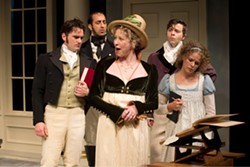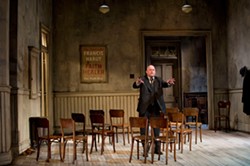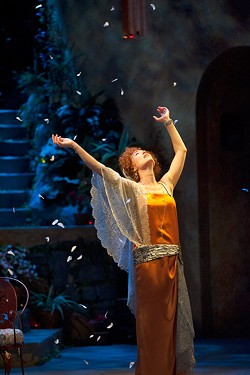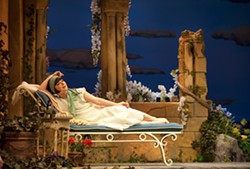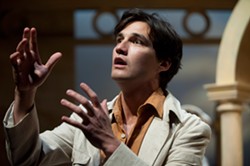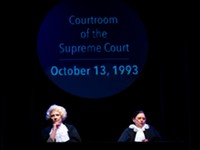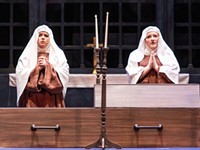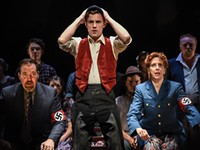[
{
"name": "500x250 Ad",
"insertPoint": "5",
"component": "15667920",
"parentWrapperClass": "",
"requiredCountToDisplay": "1"
}
]
In the four plays I just saw at the Shaw Festival, accident and unpredictability are constant, as are contradiction and reluctant confession. Some are triumphs, others anything but, but the liquid nature of identity is everywhere. Even the reliability of time is up for grabs.
That's the case in Tom Stoppard's "Arcadia" (Studio Theatre, through September 7) which receives a production worthy of its dazzling ability to play with time. It brings to the game knowledge of everything from gardening to history to mathematics to physics, all of it insightful and challenging, but none of it daunting or off-putting. Quite the contrary. Stoppard's ebullience and wit, his gift for character and intellectual play, give "Arcadia" its great appeal. It also helps to have a director (Eda Holmes) and cast in sync with its every twist and turn.
We sit in on a lesson in 1809 in a grand English country house, Sidley Hall, as young, lovely, and — as we shall learn — brilliant Thomasina Coverly (Kate Besworth) receives a lesson from her tutor, Septimus Hodge (Gray Powell). Then we are whisked forward to the present to watch two dueling scholars (Hannah Jarvis, Patrick McManus) try to piece together what happened when poet Lord Byron visited the estate, including assignations and challenges to duels. Because we know what really happened, their efforts are hilariously funny, but beneath their folly lies the painful humanizing glory to be found in the passing of time (in one direction only), the need to know, and the imperfection of understanding.
Brian Friel's extraordinary "Faith Healer" (Royal GeorgeTheatre, through October 6) is less a conventional play than a melancholy but strangely exhilarating theater piece. It consists of four monologues by three characters — "Frank," "Grace," "Teddy," and "Frank" again — who tell the story of Frank Hardy, the healer of the title, from their own perspectives. He calls what he does — the act of restoring the ill, malformed, and disabled — a performance as he works in a gray area that triangulates somewhere between truth, reality, and miracle. Sometimes, you see, in a shabby storefront or church basement, he actually does heal. He practices, he says, "craft without an apprenticeship, a ministry without responsibility, a vocation without a ministry."
Only if Frank and the others end well would it be surprising. But the play's persistent ambiguity makes it hard to know anything for sure. Is Grace his wife? Do they have a still-born child buried in a field in Northern Scotland? Do the young toughs in the pub murder Frank when he fails to heal their friend? The questions matter more than any answers, but facing the men in the bar gives Frank for the first time the aura of certainty, an escape from chance.
In its retelling of a single story, the play resembles Akira Kurosawa's classic film, "Rashomon." Here, though, as the characters contradict one another, and their emotions collide, sometimes savagely, each of them is alone on stage. The exhilaration comes from following the undermined certainties and shadowy needs that limn their fog-shrouded lives. Only Teddy, Frank's manager and the one who can still laugh after a lifetime at the seedy limits of show business, turns out to be a survivor.
When the lights rise on Jim Mezon as Frank, he appears to stand 10 feet tall, a man of imposing solidity. Then the truths and half-truths begin to emerge. Mezon is a force of nature, with that great head and rapier nose, and his voice a reed that cuts. How does another actor follow him? Corrine Koslo as Grace is a half-drunk emotional cripple who never leaves her chair, but she and Peter Krantz as Teddy are as mesmerizing as Mezon. Krantz provides comic relief that takes us deeper into the play and his character. The young director, Craig Hall, is wise enough to let the play speak for itself, rather than imposing a "vision" upon it.
Two of the plays embrace the romantic possibility of a trip to Italy. One of them lives up to it. Matthew Barber's "Enchanted April" (Festival Theatre, through October 26) is a fairy tale where good things happen. However, to be truly convincing, joyful endings must rise from the dregs of loss and the deepening temptations of despair. Set in 1922, only four years after World War I shattered England's spirit, four women abruptly leave rain-soaked London for a month in Italy, long a talisman for the English imagination. Lotty Wilton and Rose Arnott (Moya O'Connell and Tara Rosling) are trapped in marriages drained of love, young Lady Caroline (Marla McLean) parties to avoid facing the loss of those she loved; and Mrs. Graves (Donna Belleville), an elderly widow, seeks solace in memory.
Barber's stage adaptation of Elizabeth von Arnim's 1922 novel and two subsequent film versions is a small, sentimental story, but also a disarming crowd pleaser that can charm an audience into belief.
The gray first act gives us rain and the burden of the War. Its dark streak is essential because it invests the dream with reality's bitter taste. Lloyd Alexander, a spinner of fantasy novels for children, once wrote, "The muse in charge of fantasy wears good sensible shoes." The four disheartened souls achieve transformation when they rent a small castle in San Salvatore, bedecked in wisteria and awash in sunshine, overlooking the sea. Designer William Schmuck's second act set resembles a second-rate 19th century Italian painting, but the ancient walls that glow in Kevin Lamotte's golden light are richly theatrical.
The need for delight to struggle free of hopelessness helps to explain my dissatisfaction with the production. Director Jackie Maxwell chose to emphasize the comic side of the story — especially Lotty's giddy chatter, her husband's (Jeff Meadows) obtuse pomposity, and Mrs. Graves' condescension. In the process, the production loses too much of its poignancy and thus diminishes what all the characters so wondrously gain.
You can make a musical out of anything, but that doesn't mean you should. In the case of Craig Lucas (book) and Adam Guettel's (score) "The Light in the Piazza" (Court House Theatre, through October 13), a respectable 1950's matron from North Carolina (Patty Jamieson) takes her daughter Clara (Jacqueline Thair) to Italy for the first time. When Clara and a young Italian, Fabrizio (Jeff Irving), fall in love, the crisis begins to build. As a result of a head injury on her 11th birthday, Clara will develop physically but not emotionally or intellectually. Should the mother reveal the truth to Fabrizio's family?
The play's second act is stronger than the first, but neither is especially satisfying. Clara's powerful tantrum is resolved with a wave of the hand, and what amounts to a willfully blind happy ending comes about because the characters — for no discernible reason — decide that it will. The first act is repetitive and has little character development. The singing voices are at least adequate and often strong, and Thair is a lovely ingenue.
Guettel's hard-edged, post-Sondheimian score has few melodic moments; the music sometimes feels at odds with the content of the lyrics. Designer Michael Gianfrancesco's abstract module looked like a funeral bier and the three large movable arches cluttered the small stage. I kept waiting for a collision — if only to make the play more interesting.
Speaking of...
-
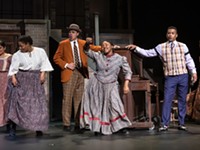
“Ragtime” evokes history through rhythm and rhyme
May 8, 2023 -

Film review: 'Ralph Breaks the Internet'
Nov 27, 2018 -

A weekend trip abroad
Jun 1, 2016 - More »
Latest in Theater
More by Michael Lasser
-
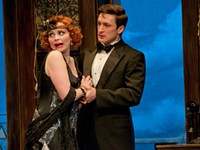
THEATER: 2013 Shaw Festival
Jul 31, 2013 -

Stratford Festival
Jun 12, 2013 -

THEATER PREVIEW: 2013 Shaw Festival
May 29, 2013 - More »
